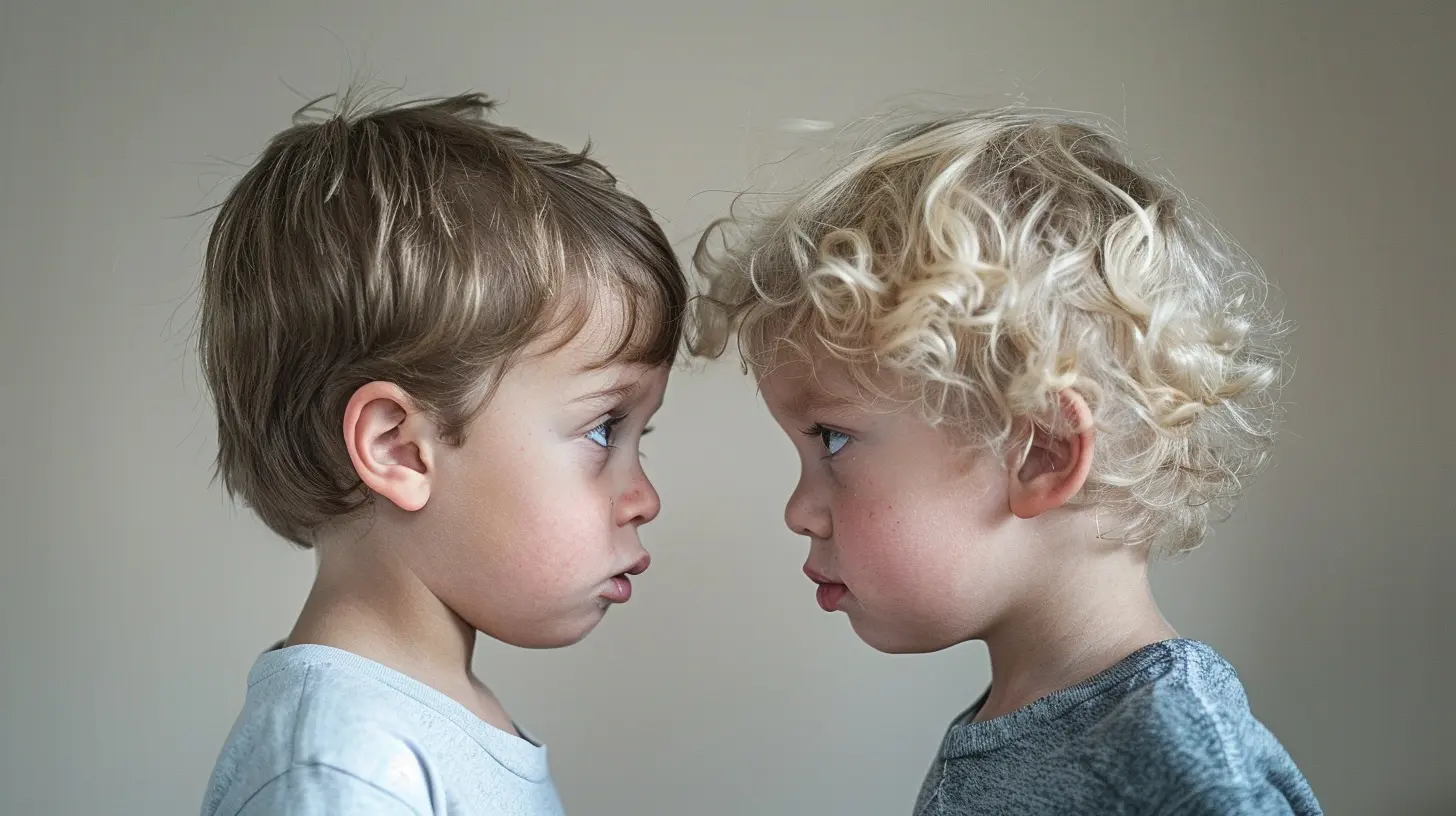How to Foster a Lasting Bond Between Your Kids
17 July 2025
Let’s be honest for a sec… getting your kids to love each other (or at least stop trying to body slam each other over the last pancake) can feel like trying to herd caffeinated squirrels. Sibling rivalry is as old as time. Cain and Abel? Yeah… didn’t end well.
But don’t worry—there’s hope. You can help your little ones build a strong, lasting bond that doesn’t involve hair-pulling, tattling, or eye rolls so fierce they could shatter glass. The good news? You don’t need a Ph.D. in child psychology to do it.
In this article, we’ll dive deep into how to foster a lasting bond between your kids—with humor, heart, and some good old-fashioned parenting elbow grease.
Why Is the Sibling Bond So Important?
Before we dive into the how, let’s chat about the why. Why should we even care if our kids get along?Well, the bond between siblings lays the groundwork for how they handle relationships later in life—friends, coworkers, partners, you name it. Also, when you're old and gray, wouldn’t it be nice knowing your kids actually like each other and won’t have a WWE-style showdown over who gets the good china?
A strong sibling relationship teaches:
- Conflict resolution (minus the screaming… eventually).
- Empathy and emotional support.
- Teamwork (like when they unite to sneak cookies before dinner).
- Lifelong companionship.
They may fight now, but if you play your cards right, they’ll be each other’s ride-or-die one day.
1. Set the Stage with Family Culture
The bond between siblings starts with the overall vibe of your house—like a family-flavored soup they’re stewing in.Make kindness your family’s “thing.”
Emphasize kindness as part of the family brand. Praise it when you see it. Model it like you're on a catwalk of compassion. Even small things like saying “please” and “thank you” to your kids go a long way.Use “We’re a Team” Language
Instead of “Don’t hit your sister,” say, “Hey, we work together in this family.” The idea? You’re all in this together like a pack of adorable, messy wolves.
2. Avoid Playing Referee (Even When You Really Want To)
When kids bicker, our instinct is to swoop in like a referee on rollerblades. But hear me out—jumping in too fast can actually backfire.Let them try to sort it out themselves. (Unless someone is bleeding. Then yeah, maybe intervene.) Conflict is a learning playground. Kids figure out negotiation, compromise, and occasionally how to admit they were wrong (miracles do happen).
But What If They're Literally Trying to Fight?
Then it’s time to intervene—but not to pick sides. Focus on guiding the conversation:- “How did that make you feel?”
- “What could we do differently next time?”
- “Do you need space or a hug... or both?”
Avoid the blame game. You’re a coach, not Judge Judy.
3. Create Shared Experiences (AKA Trick Them Into Bonding)
Kids bond like adults do—through shared memories and experiences. Think road trips, DIY slime disasters, group dance parties in the living room, or even surviving a family game night where Monopoly didn’t end in tears (miracle #2).Make Them Partners in Crime (the Good Kind)
Let them team up on tasks:- Building a fort.
- Cooking a meal.
- Completing a scavenger hunt you create (bonus: you get to sit on the couch while they run around).
When kids work together toward a common goal, they start to see each other as allies, not enemies.
4. Highlight Each Child’s Strengths (Without Comparing)
Every kid wants to feel special—but nothing torpedoes sibling relationships faster than constant comparison.“He’s so good at math, why can’t you be like him?” is the fastest way to raise resentment levels faster than a toddler on a sugar high.
Celebrate Their Uniqueness
Point out the awesome things about each child in front of their siblings.Try saying stuff like:
- “I love how creative your drawings are.”
- “You’re such a good helper when we’re grocery shopping!”
- “You always know how to make your sister laugh.”
When kids feel seen and valued, they’re less likely to compete for your attention like it’s the last cookie on the tray.
5. Don’t Force the Friendship—Build It
You can’t make your kids be besties. Trust me, I’ve tried. Bribing them with chocolate didn’t work either.But what you can do is create an environment where friendship naturally bubbles up like a carbonated family soda.
Encourage (But Never Force) Playtime
Invite them to play together, but don’t make it mandatory. Give them the space to come together on their own terms. It’s way more magical when they initiate it.You’ll know it’s working when you peek into their room and overhear them role-playing as ninjas and not arguing over who gets to be the dragon.
6. Make Time for One-on-One AND All-Together Time
If you’re a parent with more than one kid, you already know the emotional gymnastics it takes to split your time evenly. Someone always feels left out. It's basically the Hunger Games: Parenting Edition.One-on-One Time
Spend individual time with each child. It doesn’t have to be elaborate. Even 15 minutes of undivided attention can be game-changing for your bond—and it helps reduce sibling jealousy.Family Time—Sans Screens
Family movie night is great, but try activities that encourage interaction:- Charades
- Cooking together
- Backyard camping
- Board games (but maybe not Monopoly. We’ve discussed this.)
7. Teach Conflict Resolution (Like a Boss)
If you expect your kids never to fight, you probably also believe you can fold a fitted sheet without swearing.Fighting is normal. But teaching them how to fight well? That’s golden.
The Secret Sauce: Empathy
Help them understand how their sibling feels.- “How do you think that made him feel?”
- “What could you do to make it right?”
You don’t need to lecture them. Just guide them toward insight.
Teach the “3-step apology”:
1. Say what you did wrong.
2. Say how it made the other person feel.
3. Say what you’ll do differently next time.
(You can use this too when you accidentally eat the last cookie.)
8. Create Sibling Traditions
Family traditions are like duct tape—they hold things together, even when life gets messy.Same goes for sibling traditions. Little rituals help create a sense of unity and shared history.
Some Ideas:
- Secret sibling handshake- “Sibling Saturdays” where they pick an activity to do together
- Annual backyard Olympics (with made-up events like “sock toss” or “who can make the weirdest face”)
These traditions become the stuff they reminisce about when they’re 30 and texting each other memes about growing up in your house.
9. Don’t Be Afraid of the “Mom, He’s Breathing On Me!” Phase
Let’s face it. Kids are gonna argue. Sometimes it’s over big things, like who broke the LEGO masterpiece. Other times, it’s because one is breathing in the other’s general direction.It’s okay.
Disagreements don’t mean they hate each other forever. Heck, even adults get irritated with people they love. (See: every marriage ever.)
Your job isn’t to stop all the arguments. It’s to teach them that love can exist even with annoyance.
When siblings learn how to navigate ups and downs, they’re actually setting the stage for stronger, more mature relationships later on.
10. Lead By Example (Even When You're Running on Cold Coffee)
Kids are basically tiny people-shaped mirrors. If they see you showing patience, being kind, and apologizing when you mess up—they’ll learn to do the same.If they see you yelling every time someone annoys you, well… guess what?
So take care of yourself. Model emotional regulation. And don’t be afraid to say, “I’m having a tough day, but I still love you.”
That, my friend, is parenting gold.
Final Thoughts: It's a Marathon, Not a Sprint
Building a lasting bond between your kids isn’t going to happen in a week. Some days you’ll feel like a Jedi master of sibling harmony. Other days you’ll consider installing soundproof walls and legally changing your name to “Not Mom.”But stick with it.
Connection takes time. Messy, awkward, hilarious, heartwarming time.
And one day, you’ll see your kids laughing together over an inside joke or standing up for each other on the playground—and you’ll know: all those “He hit me!” moments were worth it.
So take a deep breath. Keep showing up. And remember—your kids are watching, learning, and bonding… even when they’re arguing about who gets the front seat.
all images in this post were generated using AI tools
Category:
Sibling RivalryAuthor:

Austin Wilcox
Discussion
rate this article
1 comments
Selena McQuaid
Fostering a lasting bond involves open communication, shared activities, and nurturing empathy, creating a strong foundation for sibling relationships.
August 9, 2025 at 4:19 AM

Austin Wilcox
Thank you for your insightful comment! I completely agree that open communication, shared activities, and empathy are essential for building strong sibling relationships.


